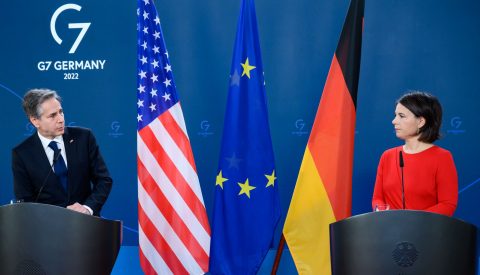Germany Urges More Action Against Global Hunger Crisis
Europe, Latest Headlines Sunday, June 26th, 2022
(AFRICAN EXAMINER) – The German Government has called on the international community to increase its efforts in the fight against the worsening hunger crisis in many parts of the world.
German Foreign Minister, Annalena Baerbock gave the charge while speaking at a joint press conference on the International Conference on Food Security at the German Federal Foreign Office in Berlin.
This is coming at the heels of the G7 ministerial conference with theme, “Uniting for Global Food Security”, hosted by the German government to coordinate responses to the global food crisis caused by climate change, the Covid-19 pandemic, and heightened by the war in Ukraine.
The minister said more than €44 billion ($46.4 billion) will be needed this year to combat hunger, out of which only half has been accounted for so far.
Baerbock noted that the situation is drastic, with 345 million people at risk of suffering from food scarcity. “It is a hunger crisis that is looming over us like a life-threatening wave”, she said.
She further observed that the reasons were partly to do with climate change and the COVID-19 pandemic. She said “but only with Russia’s invasion of Ukraine did the wave become a tsunami”.
She also accused Russia of using hunger “as a weapon” and “taking the whole world hostage”.
Earlier in her opening remarks at the G7 ministerial conference, the minister said there was an urgent need as a result of the war and disruptions to food production in Ukraine, one of the world’s leading food baskets, to provide humanitarian assistance, especially to vulnerable groups.
She said in 2022, Germany would provide €2.8 billion to its humanitarian partners to support relief effort.
“We are calling on everybody to join forces to help put food on the plate for those who are starving, to bring medicine to the sick and to provide shelter to those who have had homes taken from them.
“In all of this, our response needs to be swift and bold – it’s not an easy task, but we are here today to say we are acting united around the world”, she stressed.
Other dignities present at the conference include the German development minister, Svenja Schulze, and agriculture minister, Cem Özdemir, along with around 50 delegations and roughly 40 ministers. US Foreign Minister Antony Blinken had also made the trip to Berlin to attend.
Schulze said that around 400 million people across the world rely on food from Ukraine, noting that not only have the deliveries from Ukraine stalled, the higher prices for food and energy on account of the war are hurting many more countries. “It is always the poorest who suffer the most”, she said.
She disclosed that the government will supply a further €4 billion this year to fight hunger. She also stressed the importance of avoiding future food shortages with more sustainable practices.
The minister suggested that planting more resilient and climate-adapted crops such as millet in developing countries, higher storage capacities on site, and more regional trade will be necessary.
In his remarks, Özdemir criticized the “multidimensional warfare” of Russian President Vladimir Putin. He said Russia was trying to defeat Ukraine militarily, wage a war of hunger against the global south, and a war of energy against the European Union.
“That is why today’s message is also: We will not be cowed by Putin”, he declared.
At the G7 conference on Friday, Ministers from African countries, including South Africa, Mauritania, Tunisia and the Democratic Republic of the Congo, highlighted the socio-economic impact of climate change, COVID-19 and the war in Ukraine. They called for accelerated effort to end the war.
Addressing the conference by videoconference, President of the African Development Bank Group, Dr. Akinwumi Adesina thanked the German government for inviting him to the G7 Ministerial Meeting on global food security.
“I applaud the leadership of Chancellor Olaf Scholz and the German G-7 Presidency on the ‘Global Alliance for Food Security’. The African Development Bank will partner with the Alliance”, he added.
Dr. Adesina urged Germany and other G7 countries to support a $1.5 billion African Emergency Food Production plan developed jointly by the Bank and the African Union to help African countries avert a looming food crisis.
“While the African Development Bank has mobilized $1.3 billion of the $1.5 billion needed for the African Emergency Food Production Plan, we have a financing gap of $200 million. I would therefore like to request that Germany and all G-7 countries help provide this balance of $200 million.
“I raise my voice on behalf of the 1.3 billion people affected in Africa by a looming food crisis arising from this war. For Africa, we must, however, move beyond emergency food aid. We must prioritize food production. We have the technology to feed Africa – Africa does not need to hold bowls in hand to beg for food. Africa needs seeds in the ground to produce food for itself”, he further stated.
Similarly, the United Nations (UN) Secretary General, Antonio Guterres issued a strong plea saying, “hundreds of millions of people on the poverty line have been crushed by this crisis, informal workers who are mainly women, smallholder farmers, micro and small business owners, people with disabilities”.
Guterres called on the developed nations and international financial institutions to make resources available to help governments support and invest in their people, leaving no one behind.
“Developing countries that face debt default must have access to effective debt relief to keep their economies afloat and their people thriving”, he added.
US Secretary of State Antony Blinken said: “We’ve all cited numbers of this growing food insecurity. But what we know is this: We know that those numbers are people, real people, real lives, real livelihoods, mothers, fathers, children”.
Blinken said it is time to turn the responsibilities and pledges of the various blocks and institutions into concrete action. He noted that the US last month approved $5.5 billion in new funding for global food security and humanitarian assistance in addition to an earlier commitment of $2.8 billion.
Related Posts
Short URL: https://www.africanexaminer.com/?p=78252






















